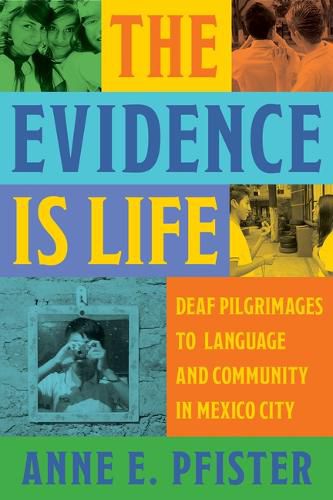Readings Newsletter
Become a Readings Member to make your shopping experience even easier.
Sign in or sign up for free!
You’re not far away from qualifying for FREE standard shipping within Australia
You’ve qualified for FREE standard shipping within Australia
The cart is loading…






Drawing on theories of language socialization and communities of practice in an ethnographic study of deaf children and their families in Mexico City, sociolinguistic and medical anthropologist Anne E. Pfister shows how her participants reject stigmatizing social and biomedical beliefs about deafness. Grounded in over ten years of ethnographic research through participant observation, visual methods, and participatory analysis, The Evidence Is Life shares the story of La Familia Lopez, a composite narrative woven from the common themes and experiences of the deaf individuals and families in Pfister's study. The story of the Lopez family is framed as a pilgrimage, through which readers reflect on participating families' journeys from confusion to profound transformation. Moving from a deficit perspective on deafness to discovering the value of accessible language, the families and children in this study eventually arrive at a community of belonging. Contextualized through Mexican history and institutional structures, The Evidence Is Life illuminates common experiences, challenges dominant narratives regarding deafness, and provides recommendations for families, educators, policymakers, medical professionals, and advocates working in deaf education.
$9.00 standard shipping within Australia
FREE standard shipping within Australia for orders over $100.00
Express & International shipping calculated at checkout
Drawing on theories of language socialization and communities of practice in an ethnographic study of deaf children and their families in Mexico City, sociolinguistic and medical anthropologist Anne E. Pfister shows how her participants reject stigmatizing social and biomedical beliefs about deafness. Grounded in over ten years of ethnographic research through participant observation, visual methods, and participatory analysis, The Evidence Is Life shares the story of La Familia Lopez, a composite narrative woven from the common themes and experiences of the deaf individuals and families in Pfister's study. The story of the Lopez family is framed as a pilgrimage, through which readers reflect on participating families' journeys from confusion to profound transformation. Moving from a deficit perspective on deafness to discovering the value of accessible language, the families and children in this study eventually arrive at a community of belonging. Contextualized through Mexican history and institutional structures, The Evidence Is Life illuminates common experiences, challenges dominant narratives regarding deafness, and provides recommendations for families, educators, policymakers, medical professionals, and advocates working in deaf education.